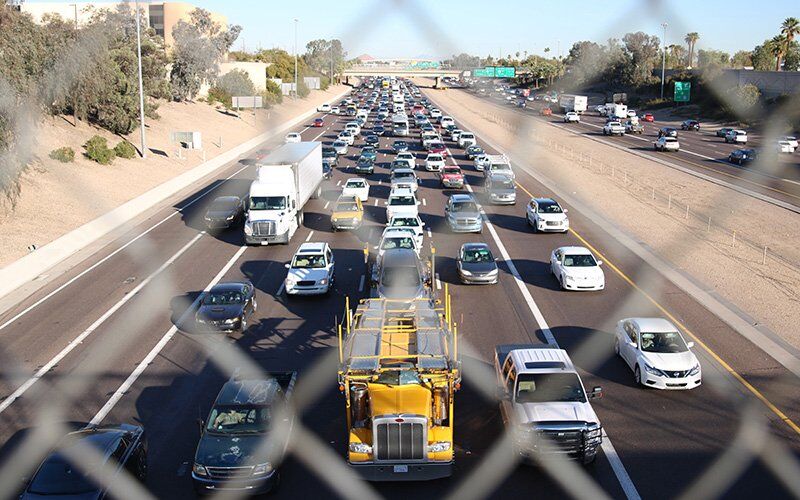PHOENIX — A months-long fight over whether to allow voters in Maricopa County to vote on a sales tax extension ended Monday as a deal cut between Republican leaders of the Legislature and Democratic Gov. Katie Hobbs passed the House and the Senate.
The votes weren't close: Seventeen of 31 Republicans joined all the Democrats in voting to send the measure to the ballot once Hobbs signs it.
And the Senate approved it on a bipartisan 19-7 vote.
“This is a continuation of an ongoing tax (of) over 40 years that not we in this chamber are going to decide, but the voters in Maricopa County will decide,” said Rep. David Cook, R-Globe. He pointed out that the legislation simply authorizes a vote next year to extend the half-cent levy to 2045.
A group of lawmakers who call themselves the Arizona Freedom Caucus, and a low-tax group known as the Free Enterprise Club that has influence among conservative Republicans, came up short in a last-ditch effort to block the tax.
Those groups’ main gripe was the amount of money from the tax that would go to transit over the 20 years it will be in effect if voters approve it next year. They argue that transit, set to receive 37% of the approximately $20 billion in sales tax revenue, benefits only a few — perhaps just 1% of county residents.
“The voters of Maricopa County want some reasonable amount of additional funding for freeways,” Rep. Alexander Kolodin, R-Scottsdale, said before Monday’s House vote. “They do not want almost 40% of the tax that we are imposing on them used for transit.”
Kolodin said the measure gives voters no choice to reject the transit spending because it is a package deal: to get the money for freeways and major street improvements, they have to support funding for transit.

The deal bars spending any of an extended road tax's proceeds on adding more light rail in the Phoenix area.
New jobs foreseen
Democrats took a victory lap after lobbying for the measure all year.
“I look forward to a lot of new jobs,” said Rep. Marcelino Quinonez, D-Phoenix. “It is time that we send this to the ballot so that Maricopa County voters can decide.”
GOP House Speaker Ben Toma put the extension of the sales tax up for a vote despite strong opposition from many of his fellow Republicans, and he defended the decision.
“We know that Maricopa County is one of the fastest-growing counties in the United States,” the Peoria Republican said as he explained his “yes” vote. “We’re one of the fastest-growing states in the United States, and that’s been due to good governance and low taxes.”
He said the money that has flowed to county highways, roadways and transit over the past 40 years has helped avoid “out of control congestion of many large cities. And that proactive approach must continue.”
The deal also picked up support from some rural GOP lawmakers.
Rep. Selina Bliss, R-Prescott, said she has a selfish interest in ensuring that Maricopa County voters get a chance to continue raising cash locally.
“Legislative District 1, which I represent .. would have to compete for funds for roads and highways from the same pot of money if this bill doesn’t pass,” she told colleagues. “With the size of Maricopa County compared to Yavapai County, you can guess how that will turn out.”
No more light rail
Toma praised the deal Republicans negotiated with Hobbs, saying it puts major guardrails on the tax money by preventing its use to expand light rail, or to be directed to air quality efforts opposed by Republicans.
The bill also has a complete ban on light rail expansion set to be built near the Capitol. While that 1.4-mile line is already funded, Toma said he didn’t want lawmakers to have to cross the tracks when going to their cars.
“In other words, it’s not coming around the Capitol,” he said. Instead, it would have to be at least 150 feet from the Capitol complex.
The Senate was preparing to vote later Monday to send the 20-year sales tax extension to voters. The House already made a motion to adjourn for the year after the Senate acts.
The deal that finally got Republican support cuts the amount of money going to transit — bus lines and light rail — from what was proposed by the regional planning agency known as the Maricopa Association of Governments to 37%. Freeways and major roads and intersections would get 63% in all.
There are also bans on cutting traffic lanes and rules requiring that projects show they will not increase congestion.
Hobbs had vetoed an earlier version passed with just Republicans backing it, one that would have required separate votes by Maricopa County residents on funding for freeways and for mass transit. Both Toma and Senate President Warren Petersen said Hobbs will sign the new version they negotiated with her.
Get your morning recap of today's local news and read the full stories here: http://tucne.ws/morning






